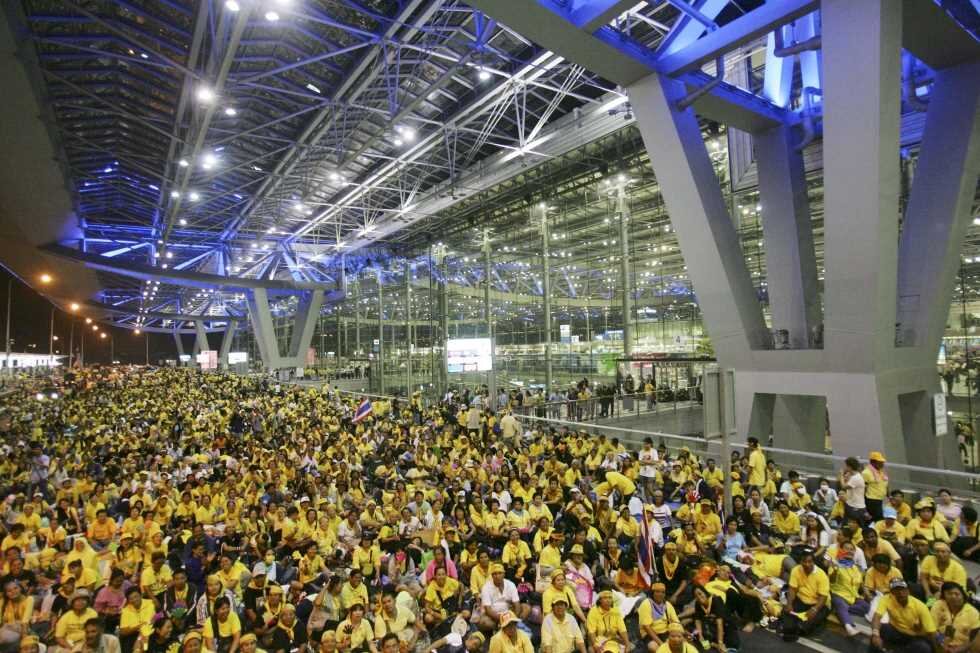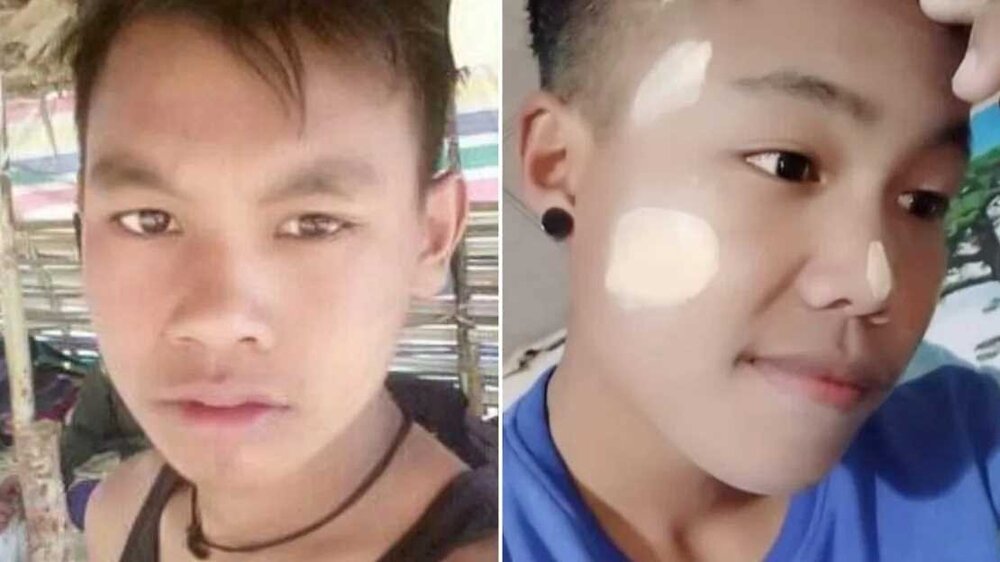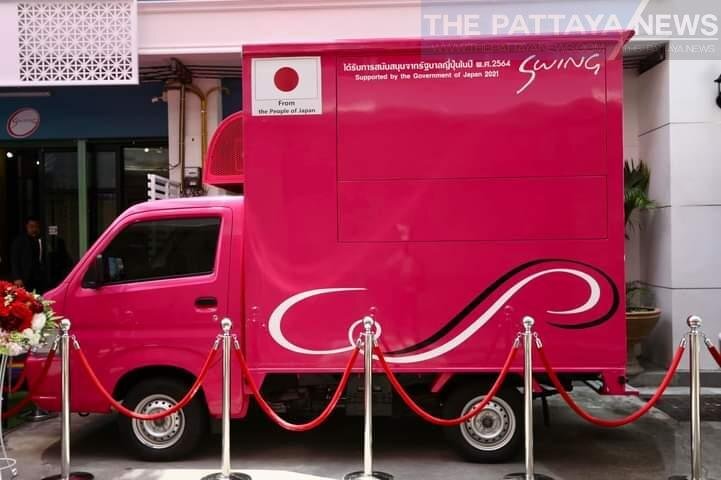
reader
Members-
Posts
10,274 -
Joined
-
Last visited
-
Days Won
262
Content Type
Profiles
Forums
Events
Everything posted by reader
-
Standard massage room (400 1 hour) are spacious with mattress pad on floor and showers down the hall. VIP rooms (600 1 hour) come with large massage table and ample sized shower/toilet en suite.
-
Court acquits protesters involved in 2008 seizure of Don Mueang airport
reader replied to reader's topic in The Beer Bar
True. And PAD is same group that was let off hook for closing Suvarnabhumi airport at the same time. (AP photo) -
One Spa appears to be in the process of updating its roster. Photos of staff no longer active have been deleted and some new arrivals have been assigned now available numbers. The highest number of 0300 was posted on line yesterday.
-
From Pattaya Mail Minimum wage hike sparks debate in Thailand’s hospitality sector PATTAYA, Thailand – The recent decision by the 22nd Wage Committee to increase the minimum wage to 400 baht per day for employees in 4-star hotels and above in ten provinces renowned for their tourism revenue has sparked debate within Thailand’s hotel sector. Effective from April 13, the wage hike aims to establish fairer standards for workers in the hospitality industry, particularly in areas heavily reliant on tourism. The affected provinces include Bangkok (specifically the Pathum Wan and Wattana districts), Krabi (only Ao Nang sub-district), Chonburi (specifically Pattaya City), Chiang Mai Municipality, Prachuap Khiri Khan (only Hua Hin), Phang Nga (only Khuekkhak), Phuket, Rayong (only Ban Phe sub-district), Songkhla (only Hat Yai), and Surat Thani (only Ko Samui). However, reactions to the wage increase have been mixed. While some argue that it’s a necessary step to ensure fair compensation for hotel employees, others express concerns over its potential ramifications. Thanet Supornsahasrungsri, president of the Association of Chonburi Tourism Federation (ACTF), emphasized the challenges faced by the hotel industry amid the Covid-19 pandemic, criticizing the minimal government assistance provided. He questioned the alignment of the wage increase with actual employee earnings, pointing out additional income sources such as service charges. Furthermore, worries have been raised about the impact on smaller hotels and secondary cities within the affected provinces. Reports suggest that employees from 3-star hotels are contemplating resigning to seek employment in higher-paying 4-star establishments. Critics also highlight the lack of clear criteria for distinguishing between 4-star and 5-star hotels, with only a single Thai hotel standard foundation responsible for evaluating hotel quality.
-
First-timer: confused about how massages work
reader replied to newtobangkok123's topic in Gay Thailand
Masseurs and hotel rooms differ slightly: only one category includes human beings asked to perform very intimate services for total strangers. But feel free not to make that distinction. Been coming to Bangkok for 22 years now and have never been charged "double or triple" for same dish. -
First-timer: confused about how massages work
reader replied to newtobangkok123's topic in Gay Thailand
Easy. I take what you charge and multiply by three. -
First-timer: confused about how massages work
reader replied to newtobangkok123's topic in Gay Thailand
If you're a foreigner who values the service at 300-500 baht. I think you'll find that you get what you pay for. -
First-timer: confused about how massages work
reader replied to newtobangkok123's topic in Gay Thailand
Well, two ways to look at it that put it in perspective. (1) Compare your monthly income to that of local Thai Twitter account member. (2) Consider how much you'd charge to give typical Bangkok tourist a handjob. 🙂 -
From The Thaiger Former Thai politician Jakrapob Pemkair returned to Thailand after 15 years of political asylum in Cambodia. Upon his return, he was apprehended due to two remaining arrest warrants but was later granted 400,000 baht bail. Jakrapob previously served as a government spokesperson under former Thai Prime Minister Thaksin Shinawatra from 2003 to 2005, and later as a minister of the Office of the Prime Minister during Samak Sundaravej’s government between 2007 and 2008. Jakrapob faced accusations of violating Section 112 of the Criminal Law, also known as the lese majeste law, after delivering a speech in English criticising the culture of patronage in Thailand. This prompted him to seek asylum in Cambodia in 2009. Jakrapob faced a total of nine arrest warrants, with seven of the cases having lapsed. However, two cases remained, including accusations of involvement in a clandestine society with unlawful aims and in the possession of weapons of war. In a 2020 interview with the BBC, Jakrapob expressed his distrust in the Thai justice process, which led him to stay abroad and not fight the lawsuits. However, yesterday, March 28, Jakrapob announced on Facebook that he was travelling to the airport to return to Thailand to face justice. He stated his intention to surrender to the authorities, expressing confidence in gaining freedom and serving the country once again. Jakrapob’s return was suspected to be involved with the return of the former PM Taksin Shinawatra. Some have said a secret deal has been struck, ensuring Jakrapob’s freedom. Jakrapob expressed his determination not to abandon his political career if given the opportunity and stated his intention to assist other leaders of the Red Shirts who wished to return home.
-
From Thailand News Agency Airports of Thailand plc (AOT) opens for Grab taxi service at Suvarnabhumi Airport to provide passengers with convenient, fast and safe public transportation services connecting Thailand’s main airport. AOT president Kerati Kijmanawat on Thursday inaugurated the Grab Service Center at the passenger terminal of Suvarnabhumi Airport to provide information services and pick-up/drop-off points for passengers using public taxi services via the Grab Application. Users can request taxis anywhere within Suvarnabhumi Airport but must use the pick-up/drop-off service on the first floor of passenger terminal, Gate 4, which operates 24 hours a day to avoid congestion for travelers on Levels 2 and 4. Additionally, this month, services will also be available at Hat Yai International Airport and Mae Fah Luang – Chiang Rai International Airport. AOT has planned to expand public taxi services through other applications to provide services at AOT airports.
-
From Thai PBS World After a wide ranging debate, the lower House has approved a study into the establishment of an “integrated entertainment complex”, which would include the first legalised casinos in the country. Two hundred fifty-three MPs voted in support of the study. There were two abstentions and two MPs declined to cast their votes. Opposition MPs apparently chose to leave the chamber. Move Forward MPs voiced support for an integrated entertainment complex to generate revenue for the state, revenues from which can be used for public benefit, but recommended that further study should be conducted on the long-term impacts, especially addiction to gambling, citing a local adage on its potential damage, which says “ten robberies do not equal one fire and ten fires are not equal to gambling.” Move Forward MP Yodchai Peungporn suggested that the House committee conduct an additional and more comprehensive study, including restrictions on customers entering the complex and the possibility that the project may lead to an increase in illegal gambling dens catering to people would have no access to the casinos in the complex. During the debate, Bhumjaithai MP Natchanon Srikorkua said that the project focuses on gambling as the only means of generating revenue, claiming that this would be harmful to society. United Thai Nation MP Witthaya Kaewparadai suggested that half of the revenues from the project should be allocated to the improvement of elderly people’s lives in the country, such as a 5,000 baht monthly state benefit.
-
NOTE -- The defendants were popularly known as "yellow shirts" at the time. From Thai PBS World The Criminal Court ordered the acquittal today of 67 members of the now defunct political pressure group known as the People’s Alliance for Democracy (PAD), after finding them not guilty on multiple charges related to the seizure of Don Mueang airport, from November 24 until December 3, 2008, in an attempt to force the resignation of then Prime Minister Somchai Wongsawat. The charges included terrorism, incitement of public unrest, illegal seizure of an airport, intimidation of officials, assault, resisting arrest and tampering with satellite communications equipment. After the reading of the verdict, one of the 67 co-defendants, Panthep Puapongpan, dean of Rangsit University’s Institute of Integrative Medicine and Anti-Aging, hailed it as one of the most significant for several years, as it recognises the right and liberty of people to stage peaceful protests and that the PAD protests were beneficial to the people as a whole. Regarding the siege of the airport, the court ruled that there was no prosecution evidence to prove that any of the 67 defendants had undertaken activities disrupting the operations of the airport or that aeronautical communications had been disrupted. The court said that the PAD’s protests were a result of the government’s attempts to amend the Constitution, to exonerate the Palang Prachachon party, which had been charged with election fraud, and to strip the Assets Examination Committee of its power to investigate the alleged corruption of Thaksin regime. Regarding the clash between some protesters and officials during the protests, the court ruled that a scuffle probably took placen, but it was not ordered by the defendants.
-
From Thailand News Agency Boys Love Fictions Takes Spotlight at National Book Fair BANGKOK, March 29 (TNA) – Boys Love or Yaoi novels are particularly popular at the National Book Fair, which marks the first time Thailand has partnered with renowned agencies from 14 countries for copyright trading. Aside from having book booths numbering up to 914, there are also over 3,000 new book covers being unveiled by various publishers. It’s truly a feast for book lovers as the trend of reading physical books is on the rise again, with over 80% opting for tangible volumes. Suwich Rungwattanapaiboon, President of the Publishers and Booksellers Association of Thailand (PUBAT), notes that this year’s bestselling book trends include various genres of novels, including translated works, dominating about 40% of the market share, with Boys Love novels comprising 20%. Among the highlights of this event is the participation of leading global publishers from 11 companies in 9 countries. The National Book Week and International Book Week will continue at the Queen Sirikit National Convention Center until April 8. Organizers anticipate over 1.5 million attendees and over 400 million baht being circulated during the event.
-
Anyone who thinks things are getting better in Myanmar are sadly misinformed. From CNN Burnings and beheadings: Myanmar junta escalates terror tactics Warning: This story contains graphic descriptions of violence. CNN — The two young men are bloodied, their feet clamped in wooden stocks. “What is the PDF (People’s Defence Force)?” their tormentors yell. “Dogs,” they reply. Humiliated and dehumanized, the men are hogtied and dragged across the rough ground by their thick chains. In front of dozens of onlookers, they are strung up to a tree and a fire stoked beneath them. As smoke rises and the flames consume them, the two men writhe and scream in agony – their final moments of unimaginable pain and horror captured on video. Phoe Tay was 21-years-old, Thar Htaung just 20. The two young men had left their family farms in northwest Myanmar to join a local armed resistance group following the 2021 military coup, hoping to bring peace and democracy to the Southeast Asian country, their fathers told CNN. But they were captured during a battle against the military on November 7 last year, and taken to a nearby village, where they were tortured and killed by a pro-junta militia under the watch of Myanmar army soldiers, according to witnesses. CNN has built a timeline of events, using accounts from more than a dozen witnesses, villagers, resistance fighters, family members and analysts, with analysis of the video and pictures from the day using open source techniques. Those accounts and analysis point to the ruling military as being responsible for the killings, in contradiction of their public denials. Phoe Tay and Thar Htaung’s deaths are horrific, but they are not anomalies in Myanmar, where the military is waging a war of terror against civilians as it finds itself increasingly on the back foot against a nationwide armed resistance determined to oust it from power. Those attacks have only increased since a rebel offensive launched five months ago resulted in major losses and defections for the military, multiple sources confirmed. By waging terror tactics including burnings, beheadings, mutilations, torching villages, and through a massive aerial bombing campaign that has displaced nearly three million people, the Myanmar military is attempting to control and divide the population through a long-established doctrine of fear and brutality, witnesses and analysts say. Continues with video and photos https://www.cnn.com/2024/03/27/asia/myanmar-military-junta-civilian-attacks-intl-hnk-dst/index.html
-
I don't do three-ways so I gladly defer to PaulSF's comments above regarding your question.
-
Yes, if you have business class boarding pass, you can proceed directly to fast track lanes in bound and outbound.
-
From Pattaya News Pattaya, Thailand – The Service Workers In Group Foundation (SWING), a community-based organization dedicated to promoting and protecting the health, human rights, and dignity of sex workers, announces a significant milestone in its mission to aid vulnerable communities impacted by the COVID-19 pandemic and HIV/AIDS. With the generous support of the Government of Japan Grant Assistance for Grassroots Human Security Projects (GGP), SWING has secured essential mobile vehicles to extend crucial services to sex workers and other affected individuals in Bangkok and Pattaya. In response to the devastating effects of the pandemic, SWING initiated the “Angel Kitchen” project in 2019, offering vital sustenance and daily essentials to sex workers facing job loss and economic insecurity. This initiative later evolved into the “Food Bank” project, facilitating broader aid distribution to sex worker communities and their families. Amidst operational challenges, including transportation limitations, SWING demonstrated unwavering commitment by utilizing its own resources and subsequently investing in a food truck to facilitate aid delivery in the Pattaya area. Recognizing the urgent need for expanded mobile services, SWING submitted a proposal titled “Providing Mobile Vehicles for HIV Testing and Food Trucks for the Sex Worker and Other Vulnerable People in Bangkok and Pattaya” to the Japanese Embassy’s GGP project. This proposal, aimed at addressing critical gaps in service provision exacerbated by the pandemic, received approval, signifying a significant collaboration between SWING and the Japanese government in advancing grassroots initiatives. The handover ceremony for the donated vehicles was held on March 27, 2024, at the SWING Foundation’s Pattaya Office in Chonburi Province. Mr. Tatsushi Nishioka, Deputy Head of Mission at the Embassy of Japan, officiated the ceremony by presenting five vans, comprising two laboratory vans, two counseling service vans, and one food truck. The esteemed guests, including representatives from the U.S. Embassy, renowned experts in public health, and local government authorities, witnessed this pivotal moment in SWING’s commitment to community welfare. “We are deeply grateful to the Government of Japan for their unwavering support, which enables us to expand our reach and enhance our services during these challenging times,” stated Professor Dr. Chalidaporn Songsamphan, Chair of the SWING Foundation Board. “With the addition of these mobile vehicles, we are better equipped to address the evolving needs of sex workers and vulnerable populations, ensuring their access to essential resources and healthcare.” The handover ceremony represents a significant step towards bolstering community resilience and fostering collaboration among stakeholders dedicated to mitigating the impacts of the pandemic. SWING remains steadfast in its mission to champion the rights and well-being of marginalized communities, with the invaluable support of partners like the Government of Japan.
-
Same-sex marriage bill easily passes its final reading in House
reader replied to reader's topic in Gay Thailand
From Pattaya Mail Legal and visa implications for gay marriage By Barry Kenyon Subject to the likely agreement of the Senate and the 120 days waiting period prior to implementation, gay marriage will be operational in Thailand in 2025. Although the new law is essentially designed to grant equality to two Thai nationals of the same sex, there will be a sizeable number of expats wanting to marry their Thai partners. Jessataporn Bunnag, a Thai lawyer based in Pattaya, said, “Longstay gay foreigners will be able to apply for the one year spouse visa which currently requires 400,000 baht in the bank or the equivalent in foreign income, plus other documentation and an immigration police visit to confirm residence and relationship.” However, Mr Bunnag added that another option for foreigners over 50 years was the retirement visa and annual extension of stay which, though less bureaucratic, requires 800,000 baht or monthly income.” Thailand already allows two foreigners (neither being a Thai) of the opposite sex to register their marriage at the amphur office, subject to both receiving an affidavit from their respective embassy in Bangkok. After the new law is introduced, this civil facility will also be available for two gay foreigners, men or women, to cement their relationship. Many Thai temples already hold ceremonies for gay couples. Formal marriage here of two same sex foreigners is likely to grow in importance in future years as Thailand is famous as a gay-friendly destination. On the negative front, Mr Bunnag said candidates for gay marriage must also understand Thai laws on divorce. “Gay marriages will break up as easily as straight ones,” he stressed. Currently, heterosexual partners can visit the amphur office for formal termination providing they have agreed the settlement terms in advance. But if one partner has gone missing, has behaved badly or is uncooperative, a civil court order may be necessary which can take months. In general terms, property and assets bought since the marriage will be divided equally, though the detail can cause problems. Thailand has long been a draw for same sex couples as it has a vibrant scene for both Thais and foreigners and, under the current Pheu Thai government, targets this market to attract increasing numbers of travellers. In 2028, Thailand is poised to become the heartbeat of gender inclusivity in hosting the LGBTQ+ worldwide summit. “It’s all looking very good,” concluded Thitian Chanmontri of the gay campaigning Rainbow Alliance. -
From The Nation Immigration police have warned the public not to believe internet posts that offer a fast track through immigration at Suvarnabhumi and Don Mueang airports in exchange for a fee. Police spokesman Maj Gen Cherngron Rimpadee said on Thursday that officials are investigating the “richcarsbangkok” Facebook page, which promises access to Immigration fast-track lanes for both incoming and outgoing travellers. Posted in English, the advert reads: “Fast Track Arrival - Departure 2,900 Baht/flight”. It also contains instructions on how to use the service to supposedly bypass immigration counters at Bangkok’s international airports. Investigators found that the Facebook page’s main business is renting out luxury cars, Cherngron said. He insisted that there was no such thing as an “immigration fast track” for a fee. There was no need for such a service since Immigration police have streamlined the process at airports and reduced waiting time to less than 15 minutes, even during rush hours, he said.He added that the fast track lanes at immigration booths are reserved for priority passengers, including the disabled, travellers with infants, pregnant women, seniors over 70, and holders of diplomatic visas, elite cards, Thai long-stay and APEC cards. Officials are investigating other pages on social media that may be advertising similar services and would pursue appropriate legal action, the spokesman said.
-
From Thai PBS World The elevated Yellow Line monorail service in Bangkok is suspended until midnight, to allow for repairs and a thorough inspection, following an incident in which metal debris fell from the track onto traffic below on Srinakarin Road this morning, damaging some vehicles. Industry Minister Suriya Juangroongruangkit has ordered a tightening of safety measures, to prevent another accident, according to his advisor Pongkawin Juangroongruangkit, who visited the scene of the incident today. “If this happens again, the minister has stated that he would review the contract and those found to be responsible could face penalties,” said Pongkawin. According to the Rail Transport Department’s inspection report, issued at about 8:30am, the conductor rail between Kalantan and Si Udom stations fell onto the walkways, causing loose metal debris to fall to the ground, resulting in the suspension of services on the entire line. Officials had to evacuate passengers stranded in two carriages when the accident occurred. The falling debris damaged one minivan, a sedan and a motorcycle. No one was injured. Compensation will be provided by Eastern Bangkok Monorail, the concessionaire of the line, according to Pongkawin. On January 2, a tyre fell off a Yellow Line monorail train and hit a taxi below, on Thepharak Road in Samut Prakan province. No one was injured. On December 24 last year, another section of conductor rail fell from the Pink Line monorail onto Tiwanon Road, also causing service suspension.
-
That's a fairly subjective question but I'll give it a try. Based on 40+ visits to these shops post Covid, I can honestly say that the data about body size and preferences I found to be accurate. And for the most part, they all strive to satisfy the customer because that's how they make a living. Do the guys look like the photos? Yes. But as I recently mentioned in another post, some of the veteran staff photos may be a few years old. And pics of a small number who have darker skin may have been edited to appear lighter. That to me, anyway, is no problem because I find those cooper toned guys attractive. I think we all need to keep in mind that just as all of us are unique in outlook and desires, so are the guys who staff these shops. They have different personalities and backgrounds. For me, that's a plus because I want to meet a wide array of young men from different places. To those who just want an a more generic--cookie cutter if you will--experience, I'm confident they'll still come away satisfied, also. I think if we put ourselves in the place of the young men we encounter, we can appreciate what goes into their job. They agree to meet clients they've never seen before and have no idea how the next hour or so will unfold. I'm always amazed how often they pull it off with aplomb.
-
Court orders cop to pay 27.3m baht to parents of eye doctor he ran over
reader replied to reader's topic in The Beer Bar
Although the laws of tort liability differ in Thailand, the conduct of the employee was so egregious that their dismissal from the RTP would have warranted dismissal. -
From VN Express Restructuring and recalls have left Vietnamese airlines with access to around 40 fewer planes than they had at this time last year, struggling to meet travel demand. A representative of the Civil Aviation Authority of Vietnam said on Tuesday that the number of commercially active planes utilized by the country's six airlines was only 170 by the last week of March, a drop of around 40 planes compared to the same period in 2023. Major restructuring initiatives currently being carried out, resulting in reductions in company scale -- including in decreased numbers of available pilots, crew and other staff – been identified as a main driver in the decreasing numbers of aircraft. Bamboo Airways previously had 28 planes, and now the carrier is only utilizing 9 aircraft as it follows through on its ongoing plan to return all of its Embraer E190 aircraft. Pacific Airlines have also returned all six of Airbus 320 planes as part of its flight crew restructuring plan. Starting from this year, U.S. aerospace manufacturer Pratt&Whitney had to recall its engines due to manufacturer errors. Vietnam Airlines and Vietjet Air had around 40 planes using the recalled engine, so those aircraft were suspended for the 2024-2025 period for maintenance. The drop in the number of commercial planes has caused several domestic air routes to launch fewer and less frequent flights. Bamboo Airways has halted several international and domestic air routes that were employing the Embraer E190. Such routes include important flights from the capital of Hanoi in the north to Hue and Dong Hoi in the central region, as well as Con Dao and Ca Mau in the south. Major flights from HCMC to Dong Hoi and Con Dao have also been canceled. Fewer planes now means it's tougher for domestic airlines to serve travelers, especially as the Reunification Day holiday (April 30) and summer holidays approach, when travel demand is expected to rise by 5-7% compared to the same period last year. Ticket prices will also increase as a result.
-
Or rent room at One Spa for 24 hours (1,000), avail yourself of "buffet" benefit (400) and have mamasan send you new boy every hour (24,000). Another option would be to try a sauna. 39 Underground in Saphan Kwai might fill the bill nicely and it wouldn't cost you anything more than price of admission.
-
The other shops on the road regularly post photo arrays. Here's one today from KK Massage: And another from nearby Home Spa:







